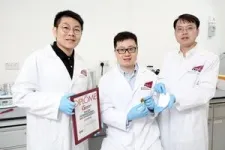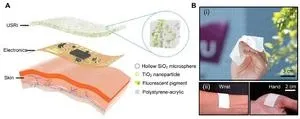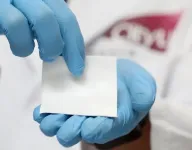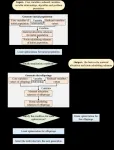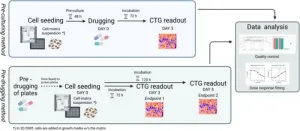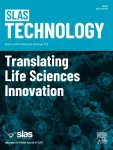(Press-News.org) WEST LAFAYETTE, Ind. – Humans contain multitudes. Each person on the planet contains enough DNA to stretch to Pluto – several times.
Studying how all this genetic material works, and especially how genes influence human behavior, is an enormously complicated undertaking – one that’s being made easier by the emergence of massive banks of genetic data and complex data science analysis techniques to parse that data.
Robbee Wedow, an assistant professor of sociology and data science in Purdue University’s College of Liberal Arts, an adjunct assistant professor of medical and molecular genetics in the Indiana University School of Medicine, and Purdue’s inaugural faculty-in-residence at AnalytiXIN/16 Tech in Indianapolis, maps those miles of genes for insights into how genetics interacts with social forces and environments. He uses genetic databases to study how tiny bits of genes called single nucleotide polymorphisms, or SNPs, affect complex, overarching traits including sexual behavior, educational attainment, socioeconomic status, health behaviors and more.
“We know that social forces like socioeconomic status play a role in influencing a person’s life and life outcomes,” Wedow said. “But we also know there is a genetic component to every behavior. What we don’t understand yet is how these biological forces interact with the environment and what these sorts of interactions might mean for social science – and what we think we know about social science research to date. We are using well-powered genetic data to do more accurate and replicable social science and to explore what might be possible at the intersection of genetic and behavioral science.”
When scientists sequenced the first human genome in 2003, the true scale of genetics started to become apparent. Early geneticists thought that finding a gene for each trait was simply a matter of looking in the right place.
However, DNA bases and genes are not simply keys on a massive piano upon which human lives are played like masterpieces. Instead, DNA operates more like a pipe organ, where stops, switches and pedals can change the way notes sound, mute them or increase their volume. Environment, nutrition, pollution, life experiences and other circumstances can change when and how genes matter for certain outcomes, and even change which places in the genomes matter for those outcomes altogether. There isn’t a single gene for a behavioral outcome. Biology isn’t destiny: It may lay out the musical score, but musicians are free to improvise and interpret as they play.
The idea, Wedow stresses, is not that these genes control a person’s life or destiny. Each SNP, in fact, has a very small effect on an overall outcome like educational attainment. No “Gattaca”-level reading of one’s destiny from their genes – in the style of the dystopian 1990s movie – is on the horizon. Rather, being able to clarify the genetics of certain behaviors can help scientists understand the nuances of human behavior.
“People think that genetics is always about biology, but in the case of sociogenomics it’s more about using the advantages of this new, well-powered data to better understand the outcomes themselves, or about allowing researchers to do more accurate social science and behavioral research,” Wedow said. “The social sciences have recently struggled with replicating studies. Oftentimes the sample sizes are too small for rigorous estimates and certainty. That’s where the potential of using these huge banks of genetic data for the social sciences comes in. They help us get a much clearer, more certain look at what’s really going on.”
Analyzing the genetics is only the first step. An American geneticist in the early 1800s could have correlated genetics with educational mastery and concluded that anyone with two X chromosomes tended to have less education. That is not because the chromosomes had anything at all to do with education. Rather, the correlation reflected social and gender biases present in the culture at the time. Similar insights lurk in Wedow’s research.
“Sociogenomics isn’t necessarily about biology, like some might think,” Wedow said. “When someone studies cancer genetics, they are studying it because they want to elucidate the biology of cancer; they want to figure out ways to better diagnose it, track it and treat it. But researchers in the field of sociogenomics want to study the genetics in order to do better social science. No one would ever study sociology without considering socioeconomic status and environment. We want to be able to take genetics into account in the same way.”
In a study in volume 7, No. 7 of the journal Nature Human Behaviour, Wedow, his co-corresponding author Andrea Ganna from the University of Helsinki, and his other co-authors looked at 109 survey questions in over 300,000 individuals to examine the ways that people’s genes correlated with whether they answered certain questions or left them blank in surveys answered in the UK Biobank. That may sound fairly abstruse, but it fills a gap that the field of sociology has struggled with for decades.
“How do you know what you don’t know or how someone might have answered a question if they choose not to answer it?” Wedow said. “It turns out that the genetics of people who either answer the survey question, or do not, overlaps with the genetics of other outcomes like education, income or certain health behaviors.”
That means that scientists can use this type of data to get a better understanding of how people who choose not to answer questionnaires might also share similar responses to questions about health or social behaviors. Geneticists can also use the results of this study to correct for bias in genetic studies of any behavioral, psychiatric or medical outcomes.
“We can’t parcel out the signal from the noise yet or causally tease apart the effects of environment from the effects of biology,” Wedow said. “We know the genetics correlate with certain outcomes, but we are not at a point where we can say any specific gene causes any one outcome. The effect of each individual gene is small. It’s only in large data sets that we start to get the statistical power to get meaningful, reproducible results. We are using these new exciting, emerging data and tools to revolutionize social science.”
About Purdue University
Purdue University is a top public research institution developing practical solutions to today’s toughest challenges. Ranked in each of the last five years as one of the 10 Most Innovative universities in the United States by U.S. News & World Report, Purdue delivers world-changing research and out-of-this-world discovery. Committed to hands-on and online, real-world learning, Purdue offers a transformative education to all. Committed to affordability and accessibility, Purdue has frozen tuition and most fees at 2012-13 levels, enabling more students than ever to graduate debt-free. See how Purdue never stops in the persistent pursuit of the next giant leap at https://stories.purdue.edu.
Writer/Media contact: Brittany Steff, bsteff@purdue.edu
Source: Robbee Wedow, rwedow@purdue.edu
END
Sociogenomics: The intricate science of how genetics influences sociology
Using genetics to understand human behavior
2023-06-29
ELSE PRESS RELEASES FROM THIS DATE:
City of Hope appoints David W. Craig, Ph.D., as founding chair of its new Department of Integrative Translational Sciences within its Beckman Research Institute
2023-06-29
LOS ANGELES — City of Hope, one of the largest cancer research and treatment organizations in the United States and a leading research center for diabetes and other life-threatening illnesses, today announced that effective June 30, David W. Craig, Ph.D., will be professor and founding chair of its newly created Department of Integrative Translational Sciences within Beckman Research Institute of City of Hope. Craig also will serve as deputy director of translational sciences at Beckman Research Institute and associate ...
A seed survival story: How trees keep ‘friends’ close and ‘enemies’ guessing
2023-06-29
UNIVERSITY PARK — Around the globe, forests are facing unprecedented challenges. They're grappling with wildfires, diseases, droughts and deforestation. The survival of these great forests hinges on their ability to regrow — and for many trees, a process called "masting" is key to this regeneration.
Masting — the unpredictable boom-and-bust cycle of seed production — can have profound consequences for plant populations and the food webs that are built on their seeds. But the complex relationship between seed-production cycles and seed consumers ...
CityU awarded invention: Soft, ultrathin photonic material cools down wearable electronic devices
2023-06-29
Overheating of wearable skin-like electronic devices increases the risk of skin burning and results in performance degradation. A research team led by City University of Hong Kong (CityU) invented a photonic material-based “soft, ultrathin, radiative-cooling interface” that greatly enhances heat dissipation in devices, with temperature drops more than 56°C, offering an alternative for effective thermal management in advanced wearable electronics.
“Skin-like electronics are an emerging development in wearable devices,” said Dr Yu Xinge, Associate Professor in the Department of Biomedical Engineering (BME) at CityU, who co-led the research. “Effective thermal ...
Team applies variable reduction strategy to improve emergency material scheduling
2023-06-29
When real-world disasters occur, logistics play a crucial role in emergency disaster management. Emergency material scheduling is a vital piece of the emergency logistics plan. Having a reasonable and efficient emergency material scheduling plan is essential in order to save lives and reduce property losses. A research team has applied a variable reduction strategy to an emergency material scheduling problem. This accelerated the optimization process of the algorithms that were already being used and obtained better solutions by simplifying the corresponding emergency material schedule problem.
Their research is published in the journal ...
State-of-the-art climate models provide new insights into the relationship between Asia–Pacific upper-tropospheric temperatures and precipitation
2023-06-29
The Asian–Pacific Oscillation (APO) is a recently identified atmospheric teleconnection pattern in the Asia–Pacific sector characterized by a seesaw vibration of upper-tropospheric temperatures between Asia and the North Pacific. Teleconnections are links between weather phenomena at widely separated locations. The APO has substantial impacts on atmospheric circulation, monsoon rainfall, and cyclone activity, amongst other phenomena. Therefore, the link between the APO and climate change has become a hot topic within the climate change community. The Coupled Model Intercomparison Project (CMIP) ...
Proof of concept study shows improvements for personalized drug testing
2023-06-29
Oak Brook, IL – The June 2023 issue of SLAS Discovery contains one review article, five full-length articles and two technical briefs covering spheroid models, 3D cell high-throughput screening (HTS) applications for treating Alzheimer’s and other drug discovery research.
In drug discovery, 3D cell models have emerged as more physiologically relevant than traditional 2D cell cultures in ex vivo models. As the complexity of patient-derived primary 3D cell cultures increases, so does the need for a supportive matrix for facilitating their formation.
Featured in this month’s issue is the article “Comparison of two supporting matrices for patient-derived cancer ...
SLAS Technology provides insight into the future of bioprinting
2023-06-29
Oak Brook, IL – Ideas that were once inconceivable, such as generating human tissue for organ transplants, are quickly becoming a reality as bioprinting technology is rapidly advancing. The June special issue of SLAS Technology showcases the latest developments in the field of biotechnology with its collection of seven research articles.
“With the continuous development of novel materials, fabrication techniques and bio-ink compositions, bioprinting is poised to revolutionize many aspects of medicine, from drug development to organ transplantation,” says SLAS Technology Editor-in-Chief Edward Kai-Hua Chow, Ph.D. (National University ...
Expanding use of brief assessment tools to increase early detection of mild cognitive impairment in primary care
2023-06-29
INDIANAPOLIS – Mild cognitive impairment, which occurs in about one in six individuals in the U.S., age 65 and older, remains substantially underdiagnosed, especially in disadvantaged populations.
Convened by the non-profit UsAgainstAlzheimer’s, The Brief Cognitive Assessment Work Group, is composed of 15 clinicians, researchers and health systems administrators from across the U.S. The group advocates for early detection of cognitive impairment to benefit both patients and caregivers by providing time to plan for future care, allowing preventive steps to potentially delay some symptoms as well as recognizing cognitive impairment due to a currently treatable condition.
The ...
Cross-frequency coupling potentially advances the understanding of neural diseased states and enables therapeutic interventions
2023-06-29
A review paper by researchers at the Beijing Institute of Technology summarized recent advancements and challenges in the use of cross-frequency coupling (CFC) for neuroscience and cyborg and bionic systems (CBS).
The new review paper, published on May 31 in the journal Cyborg and Bionic Systems, provided an overview of the latest developments in CFC research, with emphasis on methodologies, neural mechanisms, and applications in CBS, especially clinical interventions.
“CFC has gained great interest as an ...
Is a foreign-sounding name a disadvantage?
2023-06-29
Sports are a way in for people who want to build contacts with other people. Sports give you an opportunity to integrate and interact with people on an equal footing. For immigrants, sports can be the key that allows them to fit into a society.
But how easy is it for people with strange names to join in the fun?
That depends on how foreign sounding a person’s name is, and perhaps where the person lives. Because the results from the experiment were not the same throughout Scandinavia. Some are more similar than others.
The rigged football experiment actually shows encouraging ...
LAST 30 PRESS RELEASES:
DGIST identifies “magic blueprint” for converting carbon dioxide into resources through atom-level catalyst design
COVID-19 vaccination during pregnancy may help prevent preeclampsia
Menopausal hormone therapy not linked to increased risk of death
Chronic shortage of family doctors in England, reveals BMJ analysis
Booster jabs reduce the risks of COVID-19 deaths, study finds
Screening increases survival rate for stage IV breast cancer by 60%
ACC announces inaugural fellow for the Thad and Gerry Waites Rural Cardiovascular Research Fellowship
University of Oklahoma researchers develop durable hybrid materials for faster radiation detection
Medicaid disenrollment spikes at age 19, study finds
Turning agricultural waste into advanced materials: Review highlights how torrefaction could power a sustainable carbon future
New study warns emerging pollutants in livestock and aquaculture waste may threaten ecosystems and public health
Integrated rice–aquatic farming systems may hold the key to smarter nitrogen use and lower agricultural emissions
Hope for global banana farming in genetic discovery
Mirror image pheromones help beetles swipe right
Prenatal lead exposure related to worse cognitive function in adults
Research alert: Understanding substance use across the full spectrum of sexual identity
Pekingese, Shih Tzu and Staffordshire Bull Terrier among twelve dog breeds at risk of serious breathing condition
Selected dog breeds with most breathing trouble identified in new study
Interplay of class and gender may influence social judgments differently between cultures
Pollen counts can be predicted by machine learning models using meteorological data with more than 80% accuracy even a week ahead, for both grass and birch tree pollen, which could be key in effective
Rewriting our understanding of early hominin dispersal to Eurasia
Rising simultaneous wildfire risk compromises international firefighting efforts
Honey bee "dance floors" can be accurately located with a new method, mapping where in the hive forager bees perform waggle dances to signal the location of pollen and nectar for their nestmates
Exercise and nutritional drinks can reduce the need for care in dementia
Michelson Medical Research Foundation awards $750,000 to rising immunology leaders
SfN announces Early Career Policy Ambassadors Class of 2026
Spiritual practices strongly associated with reduced risk for hazardous alcohol and drug use
Novel vaccine protects against C. diff disease and recurrence
An “electrical” circadian clock balances growth between shoots and roots
Largest study of rare skin cancer in Mexican patients shows its more complex than previously thought
[Press-News.org] Sociogenomics: The intricate science of how genetics influences sociologyUsing genetics to understand human behavior

